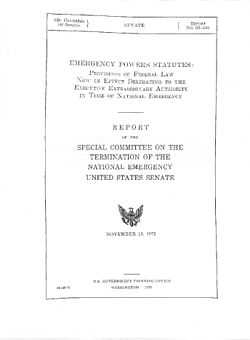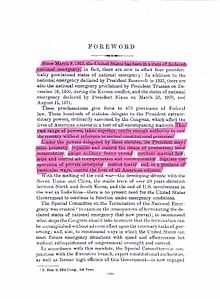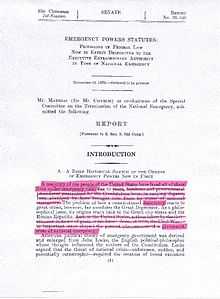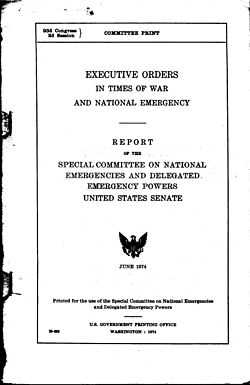Senate Report 93-549

Background and history
Senate Report 93-549 entitled "EMERGENCY POWERS STATUTES: Provisions of Federal Law Now In Effect Delegating To The Executive Extraordinary Authority In Time of National Emergency" was issued on November 19, 1973 by the "Special Committee on the Termination of the National Emergency" pursuant to Senate Resolution No. 9 - 93rd Congress, 1st Session.[1]
The “Special Committee on the Termination of the National Emergency” was created to examine the consequences of terminating the declared states of national emergency that then prevailed; to recommend what steps the Congress should take to ensure that the termination could be accomplished without adverse effect upon the necessary tasks of governing; and, also, to recommend ways in which the United States could meet future emergency situations with speed and effectiveness but without relinquishment of congressional oversight and control.[2]
At the time of these Senatorial discussions, there were in effect four presidentially proclaimed states of national emergency: In addition to the national emergency declared by President Franklin D. Roosevelt on March 6, 1933 (Proclamation No. 2039) and continued in force by Proclamation No. 2040 issued on March 9, 1933, there were also the national emergency proclaimed by President Harry S. Truman on December 16, 1950 (Proclamation No. 2914) during the Korean conflict, and the states of national emergency declared by President Richard Nixon on March 23, 1970 (Proclamation No. 3972), and August 15, 1971 (Proclamation No. 4074).[3]
These proclamations give force to over 470 provisions of Federal law. These hundreds of statutes delegate to the President extraordinary powers, ordinarily exercised by the Congress, which affect the lives of American citizens in a host of all-encompassing manners. This vast range of powers, taken together, confer enough authority to rule the country without reference to normal constitutional processes.[4]
Under the powers delegated by these statutes, the President may: "seize property; organize and control the means of production; seize commodities; assign military forces abroad; institute martial law; seize and control all transportation and communication; regulate the operation of private enterprise; restrict travel; and, in a plethora of particular ways, control the lives of all American citizens."[5]
Congressional debate to "terminate" long-running states of National Emergency terminated on August 31, 1976 when Congress passed H.R. 3884 (S. 977) and signed by President Gerald Ford on September 14, 1976 as Public Law 94-412, 90 Stat. 1255, the National Emergencies Act (50 U.S.C. 1601-1651) which codified these emergency grants of power into the U.S. Code.[6]
Title V, Section 502 of P.L. 94-412 specifically exempts the statutory authority cited in the Proclamation of March 6, 1933 (Proclamation No. 2039) and continued in force by Proclamation No. 2040 issued on March 9, 1933 - Section 5(b) of the Act of October 6, 1917 "Trading with the Enemy Act", as amended (12 U.S.C. 95a; 50 U.S.C. App. 5(b)) from termination.[7]
The "termination" was in name only. The emergency powers are now continued in the U.S. Code as permanent everyday powers.[8] The state of national emergency has become a permanent condition.[9]
States of national emergency are declared by the President by the issuance of a "Presidential Proclamation" or an "Executive Order". There is, of course, no specific constitutional authority given to do so, but the practice has never been challenged.[10] The validity of Executive Orders has been questioned many times, but a ruling as to the extent or limit to which they may be used has never been determined by the Judiciary or by the Congress.[11] Once a state of national emergency is declared, the President assumes extraordinary powers ordinarily exercised by the Congress.[12][13]
Every president since Roosevelt has used emergency powers extensively, some claim that the United States has been in a continual and permanent state of declared national emergency since March 9, 1933.[14]
Article I of the Constitution vests all legislative power in Congress. Nowhere in the Constitution is the President empowered to make law. Nevertheless, in the course of executing Acts of Congress and of directing the executive branch, the President must issue numerous orders to the bureaucracy which have a binding effect on subordinate officials, and, in many cases, on Congress, and on individuals from the general public as well. For all intents and purposes many of these Executive directives or orders constitute "law", even though the parties affected may be unaware of their existence.[15]
Beginning with F.D.R., extensive use of delegated powers exercised under an aura of "crisis" has become a dominant aspect of the presidency. Concomitant with this development has been a demeaning of the significance of "emergency." It became a term used to evoke public and congressional approbation, often bearing little actual relation to events.[16]
The Executive Order declaring a state of national emergency in the last 80 years has become a governmental instrument of broad and increasing importance, a fact which has been made particularly obvious since 1933.[17]
An Executive Order once issued remains in effect until replealed or modified or expires. Besides presidential repeal or modification, Executive Orders may be repealed or modified by an act of Congress or Concurrent Resolution, or by a decision of the Judiciary.[18]
As of October 11, 2013, President Barack Obama has issued twenty-one un-classified Executive Orders declaring a state of national emergency or modifying a perviously issued Executive Order declaring a state of national emergency[19][20] and invoking delegated extraordinary powers.[21][22]
Executive Order 13651 "Prohibiting Certain Imports of Burmese Jadeite and Rubies" - 06-06-2013
Executive Order 13645 "Authorizing the Implementation of Certain Sanctions Set Forth in the Iran Freedom and Counter-Proliferation Act of 2012 and Additional Sanctions With Respect To Iran"- 06-03-2013
Executive Order 13628 "Authorizing the Implementation of Certain Sanctions Set Forth in the Iran Threat Reduction and Syria Human Rights Act of 2012 and Additional Sanctions With Respect to Iran" - 10-09-2012
Executive Order 13622 "Authorizing Additional Sanctions With Respect to Iran" - 07-30-2012
Executive Order 13620 "Taking Additional Steps To Address the National Emergency With Respect to Somalia" - 07-20-2012
Executive Order 13619 "Blocking Property of Persons Threatening the Peace, Security, or Stability of Burma" - 07-11-2012
Executive Order 13617 "Blocking Property of the Government of the Russian Federation Relating to the Disposition of Highly Enriched Uranium Extracted From Nuclear Weapons" - 06-25-2012
Executive Order 13611 "Blocking Property of Persons Threatening the Peace, Security, or Stability of Yemen" - 05-16-2012
Executive Order 13608 "Prohibiting Certain Transactions and Suspending Entry into the United States of Foreign Sanctions Evaders with Respect to Iran and Syria" - 05-01-2012
Executive Order 13606 "Blocking the Property and Suspending Entry into the United States of Certain Persons With Respect to Grave Human Rights Abuses by the Governments of Iran and Syria Via Information Technology" - 04-22-2012
Executive Order 13599 "Blocking Property of the Government of Iran and Iranian Financial Institutions" - 02-05-2012
Executive Order 13590 "Authorizing the Imposition of Certain Sanctions With Respect to the Provision of Goods, Services, Technology, or Support for Iran's Energy and Petrochemical Sectors" - 11-20-2011
Executive Order 13582 "Blocking Property of the Government of Syria and Prohibiting Certain Transactions With Respect to Syria" - 08-17-2011
Executive Order 13581 "Blocking Property of Transnational Criminal Organizations" - 07-24-2011
Executive Order 13574 "Concerning Further Sanctions on Iran" - 05-23-2011
Executive Order 13573 "Blocking Property of Senior Officials of the Government of Syria" - 05-18-2011
Executive Order 13572 "Blocking Property of Certain Persons With Respect to Human Rights Abuses in Syria" - 04-29-2011
Executive Order 13570 "Prohibiting Certain Transactions With Respect to North Korea - 04-18-2011
Executive Order 13566 "Blocking Property And Prohibiting Certain Transactions Related To Libya" - 02-25-2011
Executive Order 13551 "Blocking Property of Certain Persons With Respect to North Korea" - 08-30-2010
Executive Order 13536 "Blocking Property of Certain Persons Contributing to the Conflict in Somalia" - 04-12-2010
None of these Executive Orders have been repealed or expired[23][24] and the United States continues to exist in a state of declared national emergency and the President continues to exercise extraordinary powers without reference to normal constitutional processes.[25]
Also see: Executive Order 13603 - National Defense Resources Preparedness - 03-16-2012[26][27]
Content

This Special Committee study, contains a list of all provisions of Federal law, except the most trivial, conferring extra-constitutional powers to the President in time of national emergency, and was compiled by the staff under the direction of Staff Director William G. Miller, and Mr. Thomas A. Dine; utilizing the help of the General Accounting Office, the American Law Division of the Library of Congress, the Department of Justice, the Department of Defense, and the Office of Emergency Planning.[28]

The US Senate Report states: "That since March 09, 1933 the United States has been in a state of declared national emergency." [29]
"A majority of the people of the United States have lived all of their lives under emergency rule. For 40 years, freedoms and governmental procedures guaranteed by the Constitution have, in varying degrees, been abridged by laws brought into force by states of national emergency."[30]
Page IV of the Report states that "The Special Committee will also publish a list of Executive Orders, issued pursuant to statutes brought into force by declared states of emergency, at a later date." [31]
The List of Executive Orders was issued pursuant to S. Res. 242, 93d Cong., 2d Sess., as an un-numbered and un-dated Committee Print entitled: "EXECUTIVE ORDERS IN TIMES OF WAR AND NATIONAL EMERGENCY" Report of The Special Committee on National Emergencies And Delegated Emergency Powers - United States Senate 93rd Congress 2nd Session, June 1974[32] for the use by the special committee.

The Special Committee stated in "EXECUTIVE ORDERS IN TIMES OF WAR AND NATIONAL EMERGENCY": "It is our hope that this compilation, in addition to the compilation of Emergency Power Statutes (S.Report 93-549) , will be of assistance to the Legislature, the Executive, and the public when the Special Committee makes its final recommendations and proposed legislation concerning how delegated emergency powers can most effectively be provided to the Executive in time of necessity and yet maintain the integrity of constitutional processes." [33]
The means used by the executive branch to carry out the law and the policy goals set by Congress helps to explain the dominance of the Presidency in the government of the United States.[34]
The President is now the head of the most powerful executive complex in the world. In addition to his power as the Chief Executive of the largest superstate the world has ever seen, the President possesses, through congressional delegation, a growing amount of legislative or quasi-legislative power.[35]
This enormous power is sufficient reason to determine in exactly what ways the Executive gives directions to "take care that the laws be faithfully executed." It is important that the different ways in which the President gives orders to carry out the law be understood and studied because it has become evident in recent years that many Executive directives are given without any means on the part of Congress or the public of determining whether such orders are lawful and in the spirit of our constitutional system of checks and balances.[36]
Presidential war and national emergencies powers continue to be of great Congressional and public interest. Senate Report 93-549 Emergency Powers Statutes and committee print Executive Orders in Times of War and National Emergency provide researchers, both Congressional and public, invaluable primary-source information and documentation that still remains relevant to this day, especially considering the terrorist attacks of September 11, 2001.
As part of his response to the September 11, 2001, terrorist attacks on the World Trade Center and the Pentagon, President George W. Bush formally declared a national emergency on September 14 by Proclamation 7463 and proceeded to issued Executive Orders on September 14 (E.O. 13223) and 23, 2001 (E.O. 13224) pursuant to the National Emergencies Act.
On October 8, 2001 President George W. Bush issued Executive Order 13228 establishing the Office of Homeland Security and the Homeland Security Council.
These Executive Orders have not expired or been repealed or revoked. The numerous declared states of national emergencies have been renewed, modified and expanded by President Barack Obama, and the United States continues to exist in a state of declared national emergency.
S. Report 93-549 Emergency Powers Statutes and the other reports of the Special Committee have provided the foundation of many research projects into Congressional delegated Executive extra-Constitutional authority. The importance of Senate Report 93-549 is the fact that has been cited in numerous Congressional Research Service (CRS) Reports for Congress publications; books; and articles.
As the final report of the Senate Special Committee on National Emergencies suggests that the prospect remains that further improvements and reforms in this policy area might be pursued and perfected.[37][38]
The Special Committee: background and publications
Growing public and congressional displeasure with President Richard Nixon’s exercise of his war powers and deepening U.S. involvement in hostilities in Vietnam prompted interest in a variety of related matters. For Senator Charles Mathias, interest in the question of emergency powers developed out of U.S. involvement in Vietnam and the incursion into Cambodia. Together with Senator Frank Church, he sought to establish a Senate special committee to study the implications of terminating the 1950 proclamation of national emergency that was being used to prosecute the Vietnam war, “to consider problems which might arise as the result of the termination and to consider what administrative or legislative actions might be necessary.”:[39]
Such a panel was initially chartered by S.Res. 304 as the Special Committee on the Termination of the National Emergency in June 1972, but did not begin operations before the end of the year.:[40]
With the convening of the 93rd Congress in 1973, the special committee was approved again with S.Res. 9.:[41]
Consequently, in 1974, with S.Res. 242, the study panel was rechartered as the Special Committee on National Emergencies and Delegated Emergency Powers.:[42]
Below is a list of publications issued by the special committee:[43]
U.S. Congress, Senate Special Committee on the Termination of the National Emergency, National Emergency, 3 parts, hearings, 93rd Cong., 1st sess., Apr. 11-12, July 24, and Nov. 28, 1973 (Washington: GPO, 1973)
U.S. Congress, Senate Special Committee on the Termination of the National Emergency, Emergency Powers Statutes, 93rd Cong., 1st sess., S.Rept. 93-549 (Washington: GPO, 1973)
U.S. Congress, Senate Special Committee on National Emergencies and Delegated Emergency Powers, A Brief History of Emergency Powers in the United States, committee print, 93rd Cong., 2nd sess. (Washington: GPO, 1974)
U.S. Congress, Senate Special Committee on National Emergencies and Delegated Emergency Powers, A Recommended National Emergencies Act, 93rd Cong., 2nd sess., S.Rept. 93-1170 (Washington: GPO, 1974)
U.S. Congress, Senate Special Committee on National Emergencies and Delegated Emergency Powers, Executive Orders in Times of War and National Emergency, committee print, 93rd Cong., 2nd sess. (Washington: GPO, 1974)
U.S. Congress, Senate Special Committee on National Emergencies and Delegated Emergency Powers, Executive Replies, 3 parts, committee print, 93rd Cong., 2nd sess. (Washington: GPO, 1974)
U.S. Congress, Senate Special Committee on National Emergencies and Delegated Emergency Powers, National Emergencies and Delegated Emergency Powers, 94th Cong., 2nd sess., S.Rept. 94-922 (Washington: GPO, 1976)
Members of the special committee at time of the publication of S. Report 93-549 were:[44]
Co-Chairmen:
Frank Church (D) Idaho and Charles Mathias (R) Maryland
Members:
Philip A. Hart (D) Michigan; Clifford P. Case (R) New Jersey;
Claiborne Pell (D) Rhode Island; James B. Pearson (R) Kansas;
Adlai E. Stevenson III (D) Illinois; and Clifford P. Hansen (R) Wyoming
Staff:
WILLIAM G. MILLER, Staff Director and THOMAS A. DINE, Professional Staff
See also
- State of emergency
- Martial law
- Continuity of Government
- Federal Emergency Management Agency
- Continuity of Government Commission
- Continuity of Operations Plan
- National Security and Homeland Security Presidential Directive
- Rex 84
- National Security Council
- United States National Security Council
- United States Department of Homeland Security
- Japanese American internment
- German-American internment
References
- ↑ [U.S. Congress, Senate Special Committee on the Termination of the National Emergency, Emergency Powers Statutes, 93rd Cong., 1st sess., S.Rept. 93-549 (Washington: GPO, 1973) | page 1]
- ↑ [U.S. Congress, Senate Special Committee on the Termination of the National Emergency, Emergency Powers Statutes, 93rd Cong., 1st sess., S.Rept. 93-549 (Washington: GPO, 1973) | page III]
- ↑ [U.S. Congress, Senate Special Committee on the Termination of the National Emergency, Emergency Powers Statutes, 93rd Cong., 1st sess., S.Rept. 93-549 (Washington: GPO, 1973) | page III]
- ↑ [U.S. Congress, Senate Special Committee on the Termination of the National Emergency, Emergency Powers Statutes, 93rd Cong., 1st sess., S.Rept. 93-549 (Washington: GPO, 1973) | page= III]
- ↑ [U.S. Congress, Senate Special Committee on the Termination of the National Emergency, Emergency Powers Statutes, 93rd Cong., 1st sess., S.Rept. 93-549 (Washington: GPO, 1973) | page= III]
- ↑ Public Law 94-412, 90 Stat. 1255, the National Emergencies Act (50 U.S.C. 1601-1651)
- ↑ Public Law 94-412, 90 Stat. 1255, the National Emergencies Act (50 U.S.C. 1601-1651)| page= 5
- ↑ http://www.gpo.gov/fdsys/browse/collectionUScode.action?collectionCode=USCODE United States Code, United States Government Printing Office
- ↑ [Harold C. Relyea Congressional Research Service (CRS) Report for Congress "National Emergency Powers" updated Sep 18, 2001 Report No.98-505 (p.10)]
- ↑ >[U.S. Congress, Senate Special Committee on National Emergencies and Delegated Emergency Powers, Executive Orders in Times of War and National Emergency, committee print, 93rd Cong., 2nd sess. (Washington: GPO, 1974) | page 143]
- ↑ >[U.S. Congress, Senate Special Committee on National Emergencies and Delegated Emergency Powers, Executive Orders in Times of War and National Emergency, committee print, 93rd Cong., 2nd sess. (Washington: GPO, 1974) page 35]
- ↑ [U.S. Congress, Senate Special Committee on the Termination of the National Emergency, Emergency Powers Statutes, 93rd Cong., 1st sess., S.Rept. 93-549 (Washington: GPO, 1973) | page III]
- ↑ >[U.S. Congress, Senate Special Committee on National Emergencies and Delegated Emergency Powers, Executive Orders in Times of War and National Emergency, committee print, 93rd Cong., 2nd sess. (Washington: GPO, 1974)] | page 8]
- ↑ [U.S. Congress, Senate Special Committee on the Termination of the National Emergency, Emergency Powers Statutes, 93rd Cong., 1st sess., S.Rept. 93-549 (Washington: GPO, 1973) | page= III]
- ↑ >[U.S. Congress, Senate Special Committee on National Emergencies and Delegated Emergency Powers, Executive Orders in Times of War and National Emergency, committee print, 93rd Cong., 2nd sess. (Washington: GPO, 1974) | page 6]
- ↑ [U.S. Congress, Senate Special Committee on the Termination of the National Emergency, Emergency Powers Statutes, 93rd Cong., 1st sess., S.Rept. 93-549 (Washington: GPO, 1973) | page 5]
- ↑ >[U.S. Congress, Senate Special Committee on National Emergencies and Delegated Emergency Powers, Executive Orders in Times of War and National Emergency, committee print, 93rd Cong., 2nd sess. (Washington: GPO, 1974) | page 8]
- ↑ >[U.S. Congress, Senate Special Committee on National Emergencies and Delegated Emergency Powers, Executive Orders in Times of War and National Emergency, committee print, 93rd Cong., 2nd sess. (Washington: GPO, 1974) | page 22]
- ↑
- ↑
- ↑ [U.S. Congress, Senate Special Committee on the Termination of the National Emergency, Emergency Powers Statutes, 93rd Cong., 1st sess., S.Rept. 93-549 (Washington: GPO, 1973) | page III]
- ↑ >[U.S. Congress, Senate Special Committee on National Emergencies and Delegated Emergency Powers, Executive Orders in Times of War and National Emergency, committee print, 93rd Cong., 2nd sess. (Washington: GPO, 1974) | page 8]
- ↑
- ↑
- ↑ [U.S. Congress, Senate Special Committee on the Termination of the National Emergency, Emergency Powers Statutes, 93rd Cong., 1st sess., S.Rept. 93-549 (Washington: GPO, 1973) | page III]
- ↑
- ↑
- ↑ [U.S. Congress, Senate Special Committee on the Termination of the National Emergency, Emergency Powers Statutes, 93rd Cong., 1st sess., S.Rept. 93-549 (Washington: GPO, 1973) | page= IV]
- ↑ [U.S. Congress, Senate Special Committee on the Termination of the National Emergency, Emergency Powers Statutes, 93rd Cong., 1st sess., S.Rept. 93-549 (Washington: GPO, 1973) | page= III]
- ↑ [U.S. Congress, Senate Special Committee on the Termination of the National Emergency, Emergency Powers Statutes, 93rd Cong., 1st sess., S.Rept. 93-549 (Washington: GPO, 1973) | page= 1]
- ↑ [U.S. Congress, Senate Special Committee on the Termination of the National Emergency, Emergency Powers Statutes, 93rd Cong., 1st sess., S.Rept. 93-549 (Washington: GPO, 1973) | page= IV]
- ↑ [U.S. Congress, Senate Special Committee on National Emergencies and Delegated Emergency Powers, Executive Orders in Times of War and National Emergency, committee print, 93rd Cong., 2nd sess. (Washington: GPO, 1974)]
- ↑ [U.S. Congress, Senate Special Committee on National Emergencies and Delegated Emergency Powers, Executive Orders in Times of War and National Emergency, committee print, 93rd Cong., 2nd sess. (Washington: GPO, 1974) | page XII]
- ↑ [U.S. Congress, Senate Special Committee on National Emergencies and Delegated Emergency Powers, Executive Orders in Times of War and National Emergency, committee print, 93rd Cong., 2nd sess. (Washington: GPO, 1974) | page 1]
- ↑ [U.S. Congress, Senate Special Committee on National Emergencies and Delegated Emergency Powers, Executive Orders in Times of War and National Emergency, committee print, 93rd Cong., 2nd sess. (Washington: GPO, 1974) | page 1]
- ↑ [U.S. Congress, Senate Special Committee on National Emergencies and Delegated Emergency Powers, Executive Orders in Times of War and National Emergency, committee print, 93rd Cong., 2nd sess. (Washington: GPO, 1974) | page 1-2]
- ↑ [U.S. Congress, Senate Special Committee on National Emergencies and Delegated Emergency Powers, National Emergencies and Delegated Emergency Powers, 94th Cong., 2nd sess., S.Rept. 94-922 (Washington: GPO, 1976)]
- ↑ [Harold C. Relyea Congressional Research Service (CRS) Report for Congress "National Emergency Powers" updated Sep 18, 2001 Report No.98-505, p.18]
- ↑ Harold C. Relyea, CRS Report for Congress, National Emergency Powers, Updated Sept. 18, 2001, CRS Report 98-505, p.09
- ↑ Harold C. Relyea, CRS Report for Congress, National Emergency Powers, Updated Sept. 18, 2001, CRS Report 98-505, p.09
- ↑ Harold C. Relyea, CRS Report for Congress, National Emergency Powers, Updated Sept. 18, 2001, CRS Report 98-505, p.09
- ↑ Harold C. Relyea, CRS Report for Congress, National Emergency Powers, Updated Sept. 18, 2001, CRS Report 98-505, p.09
- ↑ Harold C. Relyea, CRS Report for Congress, National Emergency Powers, Updated Sept. 18, 2001, CRS Report 98-505, p.10
- ↑ U.S. Congress, Senate Special Committee on the Termination of the National Emergency, Emergency Powers Statutes, 93rd Cong., 1st sess., S.Rept. 93-549 (Washington: GPO, 1973) | page II]
External links
- Senate Report 93-549 Copy of Original Document (pdf) 18.4MB 627-pages
- White House website - Executive Orders
- White House website - Proclamations
- The American Presidency Project - Executive Orders
- The American Presidency Project - Proclamations
- Executive Order 13603 - National Defense Resources Preparedness - 03-16-2012
- Senate Report 93-549 HTML Version NOT COMPLETE COPY OF REPORT
- Photocopies of the Original (pdf)
- Public Law 94-412 (pdf) 5-pages from US Government Printing Office
- CRS Report for Congress "Executive Orders and Proclamations" updated March 9, 1999 95-772 A (pdf)
- CRS Report for Congress "Executive Order 12919: Emergency Powers of the President" October 23, 2000 Order Code RS20711 (pdf)
- Harold C. Relyea Congressional Research Service (CRS) Report for Congress "National Emergency Powers" updated Sep 18, 2001 Report No.98-505 (pdf)
- STATEMENT BY HAROLD C. RELYEA, CONGRESSIONAL RESEARCH SERVICE, BEFORE HOUSE COMMITTEE ON THE JUDICIARY SUBCOMMITTEE ON THE CONSTITUTION FEBRUARY 28, 2002 NATIONAL EMERGENCIES IN THE UNITED STATES (pdf)
- CRS Report for Congress "Terrorist Attacks and National Emergencies Act Declarations" updated Jan. 7 2005 Order Code RS21017 (pdf)
- CRS Report for Congress "Comprehensive National Cybersecurity Initiative: Legal Authorities and Policy Considerations" March 10, 2009 R40427
- Search Results for "Congressional Research Service Reports National Emergency Powers" from the Library of Congress CRS website